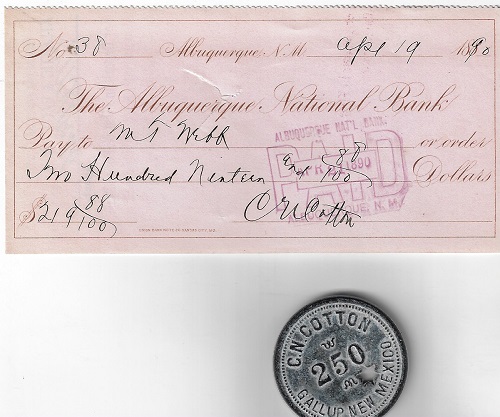TWO OF THE GREAT NAVAHO TRADING POST TRADERS – JOHN LORENZO HUBBELL AND C.N. COTTON

TWO OF THE GREAT NAVAHO TRADING POST TRADERS – JOHN LORENZO HUBBELL AND C.N. COTTON
Three of the four checks being offered are signed by J.L. Hubbell whose Hubbell Trading Post is one of the oldest on the Navajo Reservation. Opening its doors in 1878 and operated by the Hubbell family until the National Park System purchased it in 1967. Hubbell was able to use his knowledge of the Navajo culture and language to establish perhaps the most successful trading empire in the American Southwest consisting ultimately of 30 trading posts, two wholesale stores, a few curio shops and several bean and apple farms in Gallup and Farmington, New Mexico.
The check dated April 16th, 1909 is to J.N. Overson, Deputy Tax Collector for Apache County and endorsed both by Overson and Apache County Sheriff Sylvester Peralta. The March 15, 1910 check is to Hubbell’s former partner C.N. Cotton who had sold his shares of the post back to Hubbell and created a trading post in Gallup, New Mexico. The Sept 14, 1911 check is written to Col. G.W. Prichard who was an influential New Mexico attorney and politician.
The fourth check is signed by C.N. Cotton who after 1881 had an interest in the Hubble Trading Post. Hubbell and Cotton remained partners until 1894 when Hubble purchased back Cotton’s share of the post. However, there seems to be a lot of confusion as to where the two men stood in their business relationship. Hubbell’s granddaughter said that “Cotton moved to Gallup to take over the two men’s wholesale business, and the partnership continued for a while afterward.” It seemed that perhaps Cotton was functioning as Hubbell’s wholesale supplier at this point.
Also included in this small archive is a C.N. Cotton – Gallup, New Mexico token. Cotton, like Hubbell and most other traders did their purchasing ,from and paying with the Navaho with tokens. Also known as tin money, trade checks, aluminum money, chips, tin trade chips and script they were minted with the trading enterprise imprinted on them and the designated value. These were given in lieu of cash for Indian labor. Minting their own money saved traders from making cash outlays in a cash-poor business and tied the token holder to the trader’s store. Initially Navajos distrusted paper money and though this attitude changed, traders held on to the token tradition. (Source: Indian Trader – The Life and Times of J.L. Hubbell)
All checks endorsed and neatly canceled. Vg cond.

